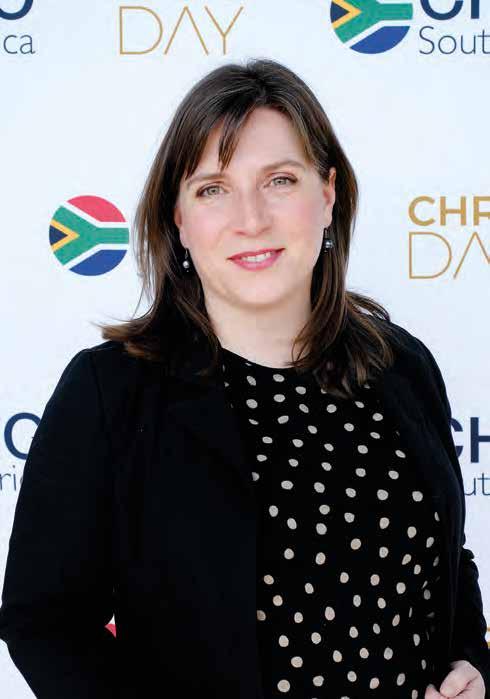
6 minute read
Deon Fredericks: Coming out of semi-retirement
BACK IN ACTION
Deon Fredericks took a hiatus after successfully creating high-performance teams at Telkom and SAA, but was called out of semi-retirement when Famous Brands wanted him to do it again. By Puseletso Mompei
Advertisement
Deon Fredericks was called out of semi-retirement in August 2021 by Famous Brands’ CEO Darren Helen and chairman Santie Botha. The company was experiencing challenges in publishing their 2021 financial results on time, and their group FD had resigned on 30 November of that year. Darren and Santie requested that Deon step in as group FD on a two-year contract with a mandate to establish a high-performing finance team and enable the placement of a new FD. “I have always been a workaholic and can’t be idle for long periods of time. It would be a new and exciting challenge for me as it was in a different industry from what I had been used to, and I knew I could add value and make a difference,” Deon says. Having taken all of this into account, he accepted. Now, Deon is rolling out a strategy which he has dubbed “Back to basics”, which is about making finance much easier, specifically in the current difficult operating and regulatory environments, ensuring that finance embraces the change. He explains that, “We are implementing a consolidation tool, which will make year-end reporting, management accounting, cashflows and projections easier. We are currently very excel driven, but that lack of automation creates significant risks and complexity. Our goal is to have an ecosystem that people can easily download reports and information from and where all our financial records, with all the businesses and subsidiaries, are integrated in one place.” Famous Brands grew from a family business into a listed corporate entity, and Deon’s team is busy upgrading internal controls. “Everyone was used to operating in a certain way that brought them success.” When transitioning to a bigger, listed entity, however, he says it is critical to improve controls and systems, and people need to buy into the journey. “We are refining and mapping the critical controls taking into account the rapidly changing operating and regulatory environments and making sure that risk control metrics are right.” Deon explains that it’s important that employees understand their overall role, the process and procedures put in place to support them, and they need to be on board about doing business differently, as a listed company.
Deon’s background
Deon grew up in Kuils River just outside Cape Town, and attended high school in the disadvantaged community of Elsies Rivier, where examples of professional success weren’t many and mentoring and career-grooming opportunities were few.
However, Deon knew he wanted to be a CA, because any activity in an organisation has a financial


impact. “We say ‘Cash is King’ because the numbers are so integral to business success,” he says. Deon became the youngest senior manager at Telkom in 1993, an experience he says was daunting, but was also a springboard for his future success. He explains that a big opportunity was participating in Telkom’s huge transformation, which was set in motion to establish the financial stability and sustainability of the company. Under the leadership of Sipho Maseko, he was part of the finance team that helped Telkom transform from being a monopoly into being a company that can successfully compete against formidable rivals. “It was very challenging,” he recalls, adding that the experience came with many successes and learnings. “One of the key takeaways is that culture change is critical, because if you keep doing the same thing, you get the same result. It was important to make sure everyone is on board, aligned and working towards the same goal.” He says that a paradigm shift is key to being successful and that at Telkom it started off with changes such as being cost conscious and prudent about all cost efficiencies (even the small ones), before scaling into bigger shifts and changes. “In addition to this, managing your greatest resource, people, is important as success is achieved through people. A company is only as good as the cohesive management and support team it creates to drive the strategy.” He says when embarking on a major business change, leaders need to establish clarity from the start and set the example. Tone at the top is critical especially in relation to ethics. “We had push back from management and employees but made a case
until people bought in and understood the reality of the company’s situation, the benefits and the nonnegotiables. It was fulfilling to be able to reinvent the company and, in the process, yourself, to achieve something special.” The good work was recognised by the industry in Telkom’s 2016 Annual report, which was rated most improved and moved from Good to Excellent and in 2017 the school of accounting part of SAICA development rated them number one for creating best opportunities for young talent, all of which confirmed the investments were right. Having helped Telkom become lean enough to compete with fast growing phone operators such as MTN and Vodacom, he was seconded to SAA to step in as interim CFO for a 12-month period. “I saw it as an opportunity to give back to the country. It was fulfilling and I had to understand how business works in the public sector and adapt accordingly to achieve our objectives. Furthermore, to attract talent was very difficult and you had to bring the best available resources under the circumstances to assist the entity.”
Recipe for a high-performing team
Deon notes that, in building high-performing teams, leaders often find silos in businesses. He, however, is committed to creating links between areas such as operations – allowing them flexibility to do business and at the same time align with finance so that they understand and appreciate each other’s roles. In his experience, he adds, it’s essential to create an environment where people can make mistakes and learn from them. “However, you need to be clear about certain non-negotiables, such as timelines and delivery.” He also points out that it’s important to reflect on the learnings of Covid-19 and be sure that your organisation is fit for purpose. “You want to make sure you have the right in-house skills and, looking forward, proper succession planning for the different skill sets including the appropriate training. If you don’t pay attention to that it can, in the long term, be expensive in today’s world where people are flexible and move between employment quite easily”. “Make sure you have the right people in the right seats, align expectations with requirements and support it with the required investment,” he advises. “Make the difficult decisions upfront, including moving people into right positions, providing relevant training, and exiting people where required.” l











